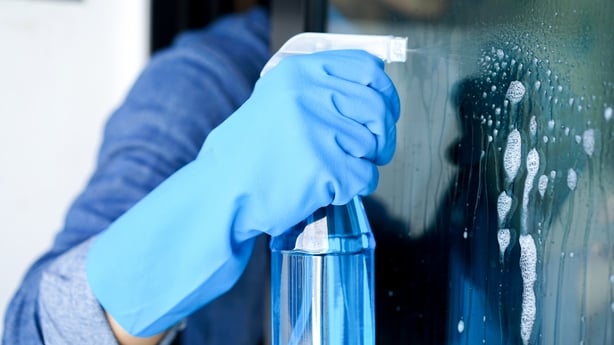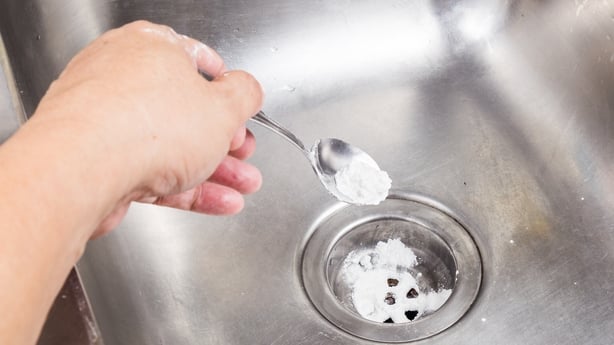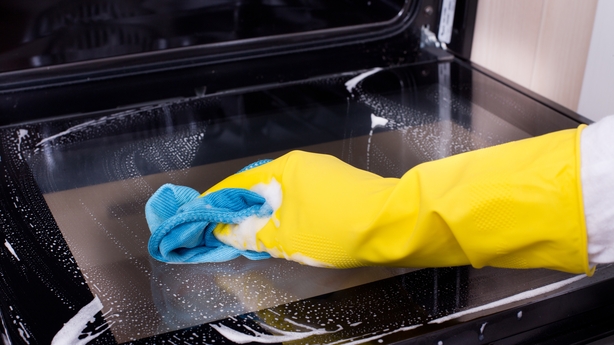Ray is joined by best-selling author Laura de Barra for a new series on spring cleaning and revamping your home. Listen back to the first episode above.
Kicking off the spring cleaning series, Laura explained that by giving your home a deep clean from time to time you'll be saving yourself time and money in the future. With sustainability at the forefront of her work, the Cork woman insists that we need to care for what we have rather than buying and replacing every year.
When it comes to the kitchen, Laura tells listeners that you shouldn't be cleaning with anything you wouldn't "put on a plate".
"I go with all natural, non-toxic cleaners," she explains. "Your eyes, your skin, your nails - you don't want to be damaging them. It's cheaper and also I wouldn't be cleaning anything in my home, especially my kitchen, that I wouldn't put on a plate."
"Spray bottles are the best. Go for glass so it doesn't absorb the smell of anything and it's better for the environment."
To make your own surface cleanser, Laura suggests making a bottle of 50:50 vinegar and warm water and throw in a table spoon of bicarbonate soda in for good measure and shake it up.
"Vinegar is quite good at taking up most bacteria, bicarb is going to neutralise odors, and then the warm water will help the two."
For anything greasy in the kitchen, Laura says washing up liquid is a "great all-rounder" that won't damage surfaces. A "good squirt" of washing up liquid mixed in a bottle with some warm water, this solution will be perfect for lifting any grease.

For a thorough spring clean, the Gaff Goddess author has some essential steps to follow:
First step
Empty everything. Pretend your moving into a brand new kitchen and remove everything from cupboards and drawers and shelves. Then give every nook and cranny a good hoover and wipe down. Don't forget to empty your hoover bag after.
Note your exits
If your sink drains need some attention, Laura suggests using a good dose of vinegar and bicarb. Two parts vinegar to one part bicarb, this fizzy solution will clear and deodorise your drains in no time. Stick the plug in and let the solution work its magic. Then, after a few minutes, you can pour some hot water down the drain to wash it all away.
The drain at the back of your fridge (you'll find it above your crisper drawer) will need a wipe down with your cleansing solution.
Your bins will also need a wipe down but if they're particularly smelly you can throw some bicarb in overnight to alleviate the odor.
The dishwasher filter is your final stop. Give it a good clean with your cleansing solution.

How to clean your fridge
In order to clean out your fridge properly, you'll need to empty it (it's a good idea to do this on the day before a big shop), however, you don't want to be keeping certain foods out of the fridge for too long. Laura suggests popping these items in a freezer bag and keeping them in the fridge while you wash the shelves.
To wash the shelves properly, you will need to remove them and give them a clean using your eco-friendly solution. Laura also advises taking the plastic strip off the glass shelves of your fridge when you're washing them for a proper clean.
Anything small and removable like those strips can be left to soak in a bath of washing up liquid and warm water.

How to clean your oven
Take the racks out of your oven and soak them in bicarb and warm water. If possible, find a large tray to soak them in so they get a thorough clean.
Next, using a rag, wipe down the inside of your oven to loosen any dirt and crumbs.
Make a paste out of bicarb and vinegar - the consistency should be that of a wallpaper paste or face mask. Before you apply it, use some foil to stuff the holes in the oven so that the mix won't leak inside. Avoid the fans and any exposed elements or aluminium parts.
Paste everything - like fake tan, you don't want to miss a spot. Leave it overnight if possible or four hours minimum. To take it off, spray your vinegar and water mix to help wipe everything away.
NB: The rubber part of the oven should only be washed with warm, soapy water as it is a porous material.
To hear more tips from Laura on cleaning your kitchen, listen back to The Ray D'Arcy Show above.

